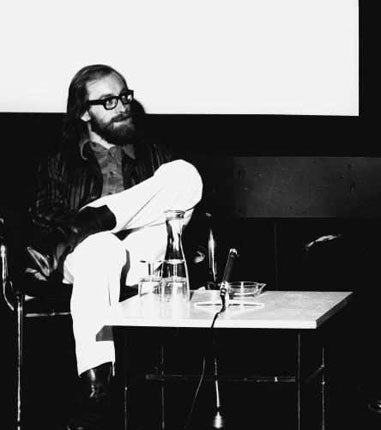Christopher Wicking: Screenwriter and critic who wrote for Hammer and worked on the adaptation of 'Absolute Beginners'

In contemporary cinema, cult directors have become almost commonplace but screenwriters are rarely accorded that ambiguous accolade.
It was the unenviable lot of the British screenwriter Christopher Wicking, who has died of a heart attack at the age of 65, to be swiftly promoted to that dubious pantheon while still in his early thirties.
His scripts for the British branch of American-International, a company specialising in horror and exploitation pictures, were quirkily arresting. He understood how to grab an audience by the lapels and hold them for the ride, even if the material to pass across his desk may have seemed, at first glance, unpromising. He created additional dialogue for The Oblong Box (1969) and then, consolidating his association with Vincent Price and director Gordon Hessler, wrote the screenplay for Scream and Scream Again (1969), perhaps his best known credit. There were several others, and later on a long association with Hammer Films which yielded productive collaborations with the former Ealing editor and director Seth Holt (Blood from the Mummy's Tomb, 1971), and, with the producer Frank Godwin, Demons of the Mind (1972). Godwin helped to inculcate discipline into Wicking's wayward working methods and they were to collaborate for over 40 years.
Christopher Wicking was educated in London at Coopers' Company's School and St Martin's School of Art. He entered films as a film booking clerk at Anglo-Amalgamated Film Distributors before moving closer to production with a stint as assistant film editor on documentaries, and thence to fledgling screenwriter. His passion, within a passion, was westerns. An early homage, Last Train to Horsted Keynes (1962), went unproduced.
He was undeterred and began writing about westerns instead. Interviews with western directors such as Anthony Mann and Delmer Daves went hand in glove with an early published critique of Budd Boetticher's minimalist westerns with Randolph Scott. In those days, he was usually ahead of the prevailing critical coteries. In 1972, he was responsible for organising and curating a splendid William Wellman retrospective at the National Film Theatre.
This parallel activity to screenwriting had its origins in the early 1960s when he was a leading light in the Magic Eye Film Society, which met in the private cinema of the Estonian embassy in London, showing such films as The Incredible Shrinking Man (1957) – hardly film society fare in those days – with Wicking as whipper-in. Saturday afternoons were reserved for double bills of masterpieces missed. The same spirit was later to permeate film courses he tutored in a variety of venues, including the Royal College of Art.
Students were quickly agog at his sparky erudition. Nor was it only film talk. To friends, he would discourse for an hour on new-kid-on-the-block Bob Dylan, and later in the evening, for a further hour, on the then controversial Richard Strauss.
As the cult following built over the years, the spectre of some of his early credits remained, however. He was still fleeing from The Murders of the Rue Morgue (1971) and the grisly mayhem of To the Devil – A Daughter (1976), while The Cry of the Banshee (1970), despite the venerable presence of the veteran actress Elisabeth Bergner, was a nightmare he no longer needed.
The horror cycle was on the wane and work became irregular. Increasingly he was called in to rewrite other writers rather than enjoy a solo credit. There was co-writer credit on Absolute Beginners (1986), Julien Temple's adaptation of the Colin MacInnes novel, but then came the "polishing" – enough to shine a Victorian range.
Television beckoned. He brought to it the same painstaking examination of material as had characterised his work for the big screen. He would describe his proposed scenes in the same cinematic way and write them that way too, as three episodes of The Professionals (1979-82) and an adaptation of the Jack Higgins thriller On Dangerous Ground (1996) attest. And there was a commissioned trip to America in 1982 to develop a TV series on missing persons, based on the files of Tracers Inc, the company that looks for missing persons. The "Bible", as it is known, of running characters and sample storylines was duly delivered but this also went missing. There was no series.
His most enduring contribution to television is the book he wrote with Tise Vahimagi, The American Vein – Directors and Directions in Television (1978). This invaluable primer constantly reminds us of an impressive roll call of major directors who greased their skillet in the arid wastes of episode TV – the likes of Robert Altman, William Friedkin and Clint Eastwood. Despite a high hack quotient he defended it stoutly, maintaining that even the worst of it had more film values than most British TV drama.
Chris Wicking's World of Cinema whirred away in his head for more than four decades, projecting one of the most fertile imaginations to bless this or any other film industry. But the industry, as ever, seldom knew what to do with it. And yet enough of his films remain to argue in favour of his favourite mantra – that mainstream commercial cinema was an honourable arena in which to leave behind an identifiable body of work. He belonged to a rare breed – the true cineaste who never directed a picture.
Christopher Wicking, screenwriter, writer and teacher: born London 10 January 1943; twice married (one son, one daughter); died Toulouse, France 13 October 2008.
Join our commenting forum
Join thought-provoking conversations, follow other Independent readers and see their replies
Comments
Bookmark popover
Removed from bookmarks